As I stand on the porch of the Williams House, feeling the warm Fernandina Beach breeze, I’m struck by the weight of history that surrounds me. I’m Veronica, the current owner of this beautiful antebellum mansion, and I’d like to share with you my experience of keeping traditions alive in this historic bed and breakfast.
Stepping into History
As I delved into the history of the Williams House, I discovered a tale of both neglect and rebirth that touched my heart. For nearly a century, this grand dame stood as a family home, passed down through generations of the Williams family. But with the passing of the last Williams son in the 1940s, the house entered a period of uncertainty.
Over the next five decades, the Williams House changed hands multiple times, and with each passing year, her beauty faded a little more. When I hear old stories from locals, my heart aches at how overgrown shrubs and vines once obscured her elegant façade. The lack of care to her exterior and general negligence masked her innate historical beauty.
It wasn’t until 1992 that the house’s fortune changed. I often think about Chris and Dick Carter Flitz, the visionaries who saw beyond the years of neglect and recognized the Williams House for the gem she truly was. They were the ones who breathed new life into these old bones, transforming the house into its first iteration as a bed and breakfast.
Standing in the parlor today, running my hand along the beautifully preserved woodwork, I feel a deep connection to all those who came before me – from the Williams family to the Flitzes, and all the caretakers in between. Every creak of the floorboards, every glint of sunlight through the original glass panes, tells a story.
The Williams House has stood witness to the ebbs and flows of time, from the tumultuous days of the Civil War to the rapid changes of the 21st century. It’s this rich tapestry of stories that makes preserving such places not just important, but essential to our understanding of who we are and where we’ve come from.
The Challenge of Preservation
When I took ownership of the Williams House in December 2020, I knew I was taking on a monumental task. The house needed extensive work, both inside and out. As an architect, I was able to assess the scope of work and prioritize it, but I won’t pretend it wasn’t daunting.
Some rooms just needed a refresh, while others required extensive renovations. Catherine’s Chamber – one of the rooms located in our Hearthstone House – for instance, had to be gutted down to the studs and completely rebuilt. One of the biggest challenges was the lack of storage on the property. To minimize downtime during renovations, I had to plan meticulously, acquiring new art, furniture, supplies, drapery, bedding, and carpeting in advance.
I remember shutting down my least favorite room in mid-2021, transforming it into a staging area for the renovations to come. Some rooms were closed for several months, others for just a few weeks. We faced unexpected hurdles, like discovering that a previous owner had painted over wallpaper. Removing it risked damaging the walls, so we had to get creative with our solutions.
The amount of dust generated during renovations was incredible. Keeping it contained and out of guest spaces was a constant battle, followed by massive cleanups at the end of each project. But I’m blessed with a great team of contractors and employees who worked tirelessly to bring my vision to life.
Balancing Tradition with Modern Comfort
One of the most delicate tasks I faced was updating the Williams House for modern guests while maintaining its historical integrity. It’s a balance I strive for every day as I work to keep traditions alive in this historic inn.
Room by room, I carefully renovated, replacing outdated furnishings and decor with pieces that respect the home’s Victorian heritage while providing the comfort today’s travelers expect. I made it my mission to preserve and showcase original features like the intricate woodwork, 9-foot pocket doors, and carved mantels. These elements allow our guests to experience the authentic charm of the 19th century.
One of my favorite changes was removing the heavy drapes that once covered the windows. The natural light that now floods the spaces has transformed the house, brightening the interiors and allowing the architectural beauty to shine through. It’s a simple change that created a harmonious blend of past and present.
A Living Part of the Community
For me, the Williams House isn’t just a business; it’s an active participant in the vibrant Fernandina Beach community. I love opening our doors to residents and visitors alike, sharing the house’s history and beauty with all who are interested. We host holiday tours, participate in local “sip and shops,” and even sponsor a cocktail party for the Amelia Island Museum of History’s house tours in December.
The holiday season is particularly special. We shut down for a few days to decorate, bringing in professional designers to transform the inn into a winter wonderland. Garlands, wreaths, and twinkling lights adorn every surface. It’s truly magical – like stepping into a Hallmark movie. Seeing the joy on people’s faces as they take in the spectacle makes all the hard work worthwhile.
Preserving More Than Just a Building
As I’ve delved deeper into the history of the Williams House, I’ve come to realize that I’m preserving more than just a building. I’m a keeper of stories and traditions. The unique architectural features, like the intricately detailed two-story porch designed by renowned architect Robert S. Schuyler, speak to the craftsmanship and artistry of a bygone era.
But it’s the house’s role in American history that truly humbles me. Knowing that this was once part of the Underground Railroad, with a now-lost secret room that once sheltered those seeking freedom, fills me with a sense of reverence. It’s a powerful reminder of our nation’s complex past and the courage of those who fought for justice and equality.
Challenges and Rewards
I won’t sugarcoat it – maintaining a property like the Williams House is challenging. The harsh coastal climate, the wear and tear of daily use, and the need to meet modern safety and comfort standards present ongoing hurdles. But for me, the rewards far outweigh the difficulties.
Each time I run my hand along a beautifully preserved piece of woodwork or catch a glimpse of the original fleur-de-lis wrought iron fence from 1856, I’m reminded of why I do this. By preserving these elements, I’m not just maintaining a building; I’m keeping alive the memories, craftsmanship, and values of those who came before us.
Looking to the Future
As I look to the future, I’m more convinced than ever of the importance of places like the Williams House. In our fast-paced, digital world, these tangible connections to our past become ever more precious. They remind us of where we’ve come from and help shape where we’re going.
I see the Williams House as an inspiration for how we can honor our past while embracing the future. It shows us that tradition isn’t about staying stuck in time, but about carrying forward the best of what came before us and adapting it for new generations.
A Personal Call to Preservation
As the current caretaker of the Williams House, I feel a deep responsibility to both its past and its future. But I also believe that we all play a role in keeping traditions alive. Whether it’s supporting local preservation efforts, choosing to stay at historic inns like the Williams House, or simply taking the time to learn about and appreciate the stories of our shared past, each of us can contribute to this important work.
So the next time you pass by the Williams House, or any historic building in your community, I invite you to take a moment to appreciate the stories it holds and the traditions it keeps alive. And if you do come to stay with us, know that you’re not just booking a room – you’re becoming part of a living history, creating new memories in a place that has witnessed countless stories unfold over the centuries.
In honoring our traditions, we’re not just looking back—we’re building a bridge to the future, one that’s rooted in the rich soil of our shared history. And that, to me, is what makes this journey of preservation so incredibly rewarding.


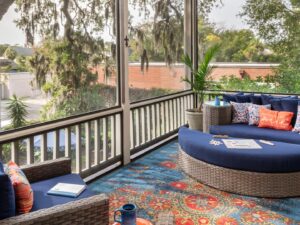
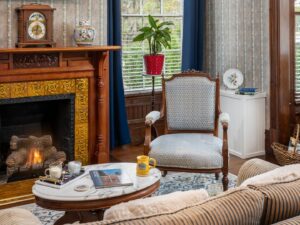
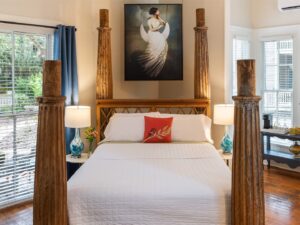
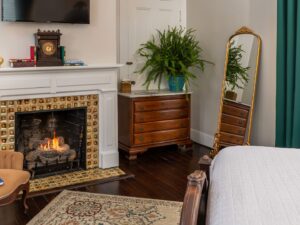
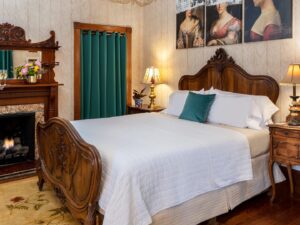
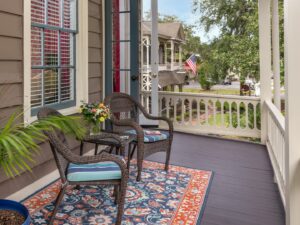
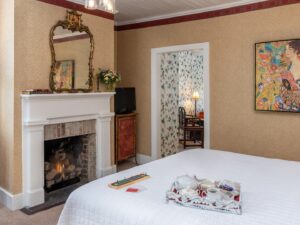

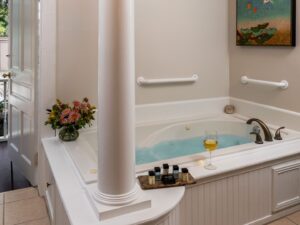

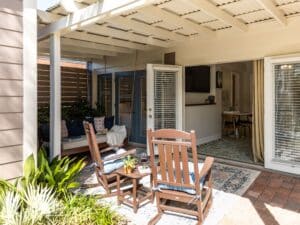

I love this! I had the pleasure of staying back in 2016 but I hope I have the opportunity to stay again in the future. What a lovely part of history.
We love the Williams House. Can’t wait to come back and meet you and see the changes you made.
My wife and I celebrated her birthday last year during late December. While in Fernandina Beach, we ate at some very fine restaurants, took the harbor boat tour and explored Amelia Island from one end to the other among many other things. The highlight of the trip was our stay at the Williams House. It was so warm and wonderful as it was decorated beautifully for Christmas. Veronica was like an old friend. She must have written the book on how to make strangers feel so welcomed to your home. Our accommodations were decorated so well and reflected the hard work that is necessary in hosting a bed and breakfast. Our breakfast the next morning was delicious and enhanced by the graciousness of Veronica and the social interaction with the other guests. I read Veronica’s history above and was struck by the love and tenacity that must go in to restoration and ongoing maintenance. It certainly was reflective of that. We will return to Williams House and look so forward to it. It is a magical place!
Thank you for sharing your story and your love for the history of the Williams House. We truly loved our stay with you and will be back!
Veronica: A most excellent upgrade of the William’s house facilities. We thoroughly enjoyed our stay and your hospitality. Cyndee & Al
You’ve done a superb job! We love it and are returning for our third visit over Christmas. We’ll keep coming as long as those wonderful (and afdictive) cookies are avaiilabke!
Scott and Karen Thorne